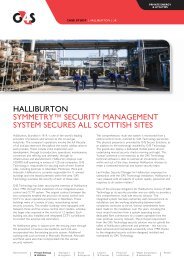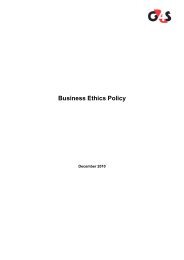G4S Annual Report and Accounts 2011
G4S Annual Report and Accounts 2011
G4S Annual Report and Accounts 2011
You also want an ePaper? Increase the reach of your titles
YUMPU automatically turns print PDFs into web optimized ePapers that Google loves.
Governance Financial statements Shareholder information<br />
3 Significant accounting policies continued<br />
(q) Leasing<br />
Leases are classified as finance leases when the terms of the lease transfer substantially all of the risks <strong>and</strong> rewards of ownership to the lessee. All other<br />
leases are classified as operating leases. This classification can be a matter of fine judgement.<br />
Assets held under finance leases are recognised at the inception of the lease at their fair value or, if lower, at the present value of the minimum lease<br />
payments. The corresponding liability to the lessor is included in the consolidated statement of financial position as a finance lease obligation. Amounts due<br />
from lessees under finance leases are recorded as receivables at the amount of the group’s net investment in the leases. Lease payments made or received<br />
are apportioned between finance charges or income <strong>and</strong> the reduction of the lease liability or asset so as to produce a constant rate of interest on the<br />
outst<strong>and</strong>ing balance of the liability or asset.<br />
Rentals payable or receivable under operating leases are charged or credited to income on a straight-line basis over the lease term, as are incentives to<br />
enter into operating leases.<br />
(r) Operating segments<br />
An operating segment is a component of the group that engages in business activities from which it may earn revenues <strong>and</strong> incur expenses, the operating<br />
results of which are reviewed regularly by the group’s CEO to make decisions about resources to be allocated to the segment <strong>and</strong> assess its performance,<br />
<strong>and</strong> for which discrete financial information is available.<br />
(s) Non-current assets held for sale <strong>and</strong> discontinued operations<br />
Non-current assets (<strong>and</strong> disposal groups) classified as held for sale are measured at the lower of carrying amount <strong>and</strong> fair value less costs to sell.<br />
Non-current assets <strong>and</strong> disposal groups are classified as held for sale if their carrying amount will be recovered through a sale transaction rather than<br />
through continuing use. This condition is regarded as met only when the sale is highly probable <strong>and</strong> the asset (or disposal group) is available for immediate<br />
sale in its present condition. The group must be committed to the sale which should be expected to qualify for recognition as a completed sale within one<br />
year from the date of classification.<br />
A discontinued operation is a component of the group’s business that represents a separate major line of business or geographical area of operations or is a<br />
subsidiary acquired exclusively with a view to resale, that has been disposed of, has been ab<strong>and</strong>oned or meets the criteria to be classified as held for sale.<br />
(t) Dividend distribution<br />
Dividends are recognised as distributions to equity holders in the period in which they are paid or approved by the shareholders in general meeting.<br />
(u) Adoption of new <strong>and</strong> revised accounting st<strong>and</strong>ards <strong>and</strong> interpretations<br />
St<strong>and</strong>ards <strong>and</strong> interpretations issued by the IASB are only applicable if endorsed by the EU. The following revisions to IFRS will be applicable in future<br />
periods, subject to endorsement where applicable:<br />
uu<br />
uu<br />
uu<br />
uu<br />
uu<br />
uu<br />
IFRS 9 Financial Instruments is applicable for 2013. This is the first step in the process to replace IAS 39 Financial Instruments: recognition <strong>and</strong> measurement.<br />
IFRS 9 introduces new requirements for classifying <strong>and</strong> measuring financial assets. The IASB has issued an exposure draft that proposes to delay the effective<br />
date of IFRS 9 to annual periods beginning on or after 1 January 2015.<br />
IFRS 10 Consolidated Financial Statements is applicable for 2013. The IFRS establishes principles for the presentation <strong>and</strong> preparation of consolidated financial<br />
statements when an entity controls one or more other entities. The IFRS supersedes IAS 27 Consolidated <strong>and</strong> Separate Financial Statements <strong>and</strong> SIC-12<br />
Consolidation – Special Purpose Entities.<br />
IFRS 11 Joint Arrangements is applicable for 2013. The IFRS establishes principles for financial reporting by parties to a joint arrangement. It is concerned<br />
principally with both the structure of the arrangement <strong>and</strong> that an entity had a choice of accounting treatment for interests in jointly controlled entities. IFRS11<br />
requires that joint arrangements be accounted for using the equity method.<br />
IFRS 12 Disclosure of Interests in Other Entities is applicable for 2013. The IFRS requires an entity to disclose information that enables users of financial<br />
statements to evaluate both the nature of, <strong>and</strong> risks associated with, its interests in other entities; <strong>and</strong> the effects of those interests on its financial position,<br />
financial performance <strong>and</strong> cash flows.<br />
IFRS 13 Fair Value Measurement is applicable for 2013. The IFRS defines fair value, sets out in a single IFRS a framework for measuring fair value <strong>and</strong> requires<br />
disclosures about fair value measurements.<br />
Amendment to IAS 19 Employee Benefits is applicable for 2013. The amendment makes changes to the recognition <strong>and</strong> measurement of defined benefit<br />
pension expense <strong>and</strong> termination benefits, <strong>and</strong> to the disclosures for all employee benefits.<br />
The group does not consider that these or any other st<strong>and</strong>ards, amendments or interpretations issued by the IASB, but not yet applicable, will have a<br />
significant impact on the financial statements.<br />
<strong>G4S</strong> plc<br />
<strong>Annual</strong> <strong>Report</strong> <strong>and</strong> <strong>Accounts</strong> <strong>2011</strong><br />
83











